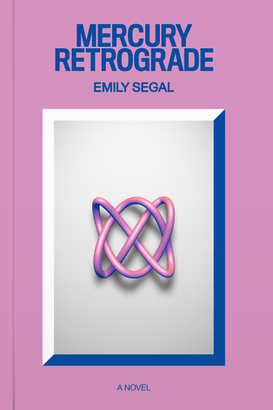Mercury Retrograde
by Emily Segal
reviewed by Daniel Rathburn
Mercury Retrograde, Emily Segal’s debut novel, is full of the kind of wry observations about semiotics and contemporary culture one expects of a piece of autofiction written by a “trend forecaster” and brand strategist. The novel is most notable, however, for its portrayal of a struggle many city-dwelling millennials will find familiar: turning the contents of your days—the job you go to but hate, the art you want to make but haven’t, the guilt you feel about both of those things, your relationships, friendships, desires, vices, along with everything else, including, especially, the constant dilemma of health insurance and its impact on your career choices—into a convincing, unified identity.
Mercury Retrograde speaks to the nature of these compromises through the narrator’s decision to take a job at eXe, an ambitious startup creating “the Talmud of the Internet,” which will place “a meta-layer of language all over the web.” The narrator, also named Emily Segal, has already rejected two job offers from Seth, one of the startup’s founders, by the time the two meet in a downtown bar in the novel’s opening scene. This time, having recently left both her boyfriend and her job at a branding agency after being asked to work for “an openly evil aerospace tech conglomerate,” Emily takes the offer.
What follows is an often hilarious portrait of life in the uber-modern workplace. The company’s office in a luxury condo building on the Williamsburg waterfront, for example, is a “place that looked like a youth hostel, people lolling about, eating hummus, receiving aluminum tins of Seamless, consulting each other, spinning around on chairs.” The building, home to “Christina Ricci and Justin Bieber’s pastor,” boasts an anonymous cast of “rich-seeming young white people” who wear outfits made of “soft synthetic material.” At eXe, even the “suits” don’t wear suits but instead have “Tibetan prayer beads coiled around their wrists.”
In response to all this, Emily cultivates an attitude of “being in, but not of.” She explains:
I liked the idea of me passing through these various spheres of industry, from art to branding to tech and back again, and imagined it made me look mobile or magical – but I did not have any particular interest in helping the business make money. I was not interested in their money beyond my salary and my expenses.
“Being an artist in any setting,” she continues, “is just code for having an alternate value system.”
These passages reveal the contradictory desire felt by many: to enjoy all the excesses of capitalism—more money, more status, nicer apartments—while not allowing consumption of these luxuries to dictate who they are. For the narrator of Mercury Retrograde, this means that Emily gets to define herself as a transgressive artist while taking company-expensed black cars to work each day. Neither the novel nor the narrator is very convincing on this point, and it is never clear what “art” Emily actually produces.
There are certain differences, however, between her and her colleagues. The skeptical, realistic approach Emily takes to her work (“I saw businesses as fictions,” she explains) contributes to the disintegration of her sense of self. Between ordering in steaks off the company credit card, expensing Ubers from Brooklyn to her therapy appointments on the Upper East Side, and becoming more alert to the depravity of the office culture (“empty vials of ketamine littered our desks at happy hour”), Emily starts to break down. Her breakdown first manifests in the narrator’s feelings about her appearance. “Getting dressed was falling apart as an information system”; she steps out of her apartment wearing increasingly “less coherent ensembles.” Then, either because of her Lexapro prescription or her existential dread (or both), a “visual disturbance” appears in her line of vision in the form of “visual noise”—a layer of shimmer which hovers over everything.
Before long things fall apart at the start-up. (Like many tech start-ups, including Genius, the lyric annotation site where Segal served as a creative director, eXe attracted millions of dollars in investments without having made a dime.) As Emily is forced to create the company’s first stream of revenue, she does what any self-respecting millennial would do: she quits, has a couple of bad nights out, and then, while drunk at an art fair in Miami, stumbles into an acceptance of life’s limitations.
While Mercury Retrograde occasionally falls into the solipsistic trap laid by autofiction, Segal’s prose awakens when it turns outward. Segal also participates in autofiction’s tradition of injecting other texts into the narrative. In this case, that includes an annotated discussion of Bob McFadden’s 1959 track “The Beat Generation,” a coded transcript of the narrator’s discussion with an aura reader, passages from Segal’s previous work, plus the genre’s favorite surface-roughening item, G-chats. These paratexts provide readers with an intriguing portrait of what it means to try to build a stable sense of self while navigating the impossibly hip, increasingly fraught scene of New York City circa 2012. Part lookbook of the era’s anxieties and attitudes, part memoir, part satire, Segal’s novel navigates these scenes as one should: with humor, irony, and style.
Published on May 28, 2021

